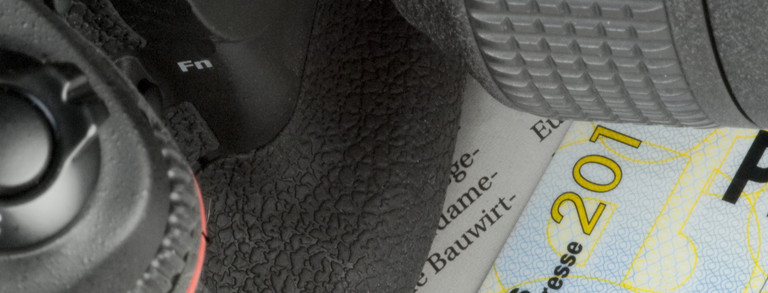“In an ideal world, there would be a ‘right to truthfulness’”
- Top News
- Campus & Culture
- People
- Press Releases

Dr. Mai Thi Nguyen-Kim visited TU Dortmund University on 20 November as part of the Institute of Journalism’s lecture series “The Knowledge Makers”. The chemist and science journalist talked about her career and answered questions from the audience in the main lecture hall, which was packed to the last seat.
“It’s never been as full at ‘The Knowledge Makers’ as it is today,” said Prof. Holger Wormer, Professor of Science Journalism, right at the start of the event, looking into the largest lecture hall on the TU campus. Together with Carlotta Wagner, a Bachelor’s student of science journalism, he moderated the one-and-a-half-hour discussion with Dr. Mai Thi Nguyen-Kim.
Nguyen-Kim, who holds a doctoral degree in chemistry has become a known public figure throughout Germany through her YouTube channel “maiLab”. She has hosted the science programs “Quarks” and “Terra X” on public television and now has her own program titled “MaiThink X” on ZDFneo. Her first steps onto the public stage, however, were not journalistic, but rhythmic: it was a dance video for the “Dance your Ph.D.” competition. “I was a hip-hop trainer at RWTH Aachen University at the time and presented my research by dancing in the video,” says Mai Thi Nguyen-Kim. The feedback was positive, but it was not until her research stay at the Massachusetts Institute of Technology in 2015 that she published her next video on her first YouTube channel, “The Secret Life of Scientists”.
Dr. Nguyen-Kim became a full-time science communicator and journalist by chance. She actually wanted to “improve the world” with her research: at the time, she was trying to find new ways to deliver anti-cancer drugs to the right place in the body and completed her doctorate on the subject in summer 2016. Shortly afterwards, she received an inquiry from “funk”, the content network from ARD and ZDF for young people – and decided to take a “sabbatical year” in science communication, which ultimately became her career path. This gave rise to her professional channel called “schönschlau”, which was renamed “maiLab” two years later.
Critically classifying facts
Today, she is one of the best-known faces on German television when it comes to communicating science. This is also accompanied by public attention, for example from the tabloid press or science deniers. “That’s not always enjoyable,” said Dr. Nguyen-Kim. “But I try to see the positive side of it: It also gives me the attention to communicate science.” With her various types of content, she is pursuing two goals: on the one hand, she wants to contribute to making current debates more objective. At the same time, she also wants to raise awareness for topics that are still unknown to the public. This is not always easy: “On television, people expect short and snappy answers that don’t always exist in science.”
She now sees herself less as a communicator and more as a science journalist. The difference: “The main task of science communication is to ‘translate’ the facts so that more people understand them. As a journalist, on the other hand, I also classify the facts critically. That’s how I see myself today.”
Young talent for science journalism
She encouraged the audience to take action themselves: “We definitely need more people communicating science – I can’t do everything on my own,” she said with a wink. During the pandemic, scientists had taken on the role of both role models and, in some cases, enemies in the public eye. Mai Thi Nguyen-Kim believes that this should not put people off. Scientific topics in particular are “very favorable” when it comes to communication, as they are fact-based and therefore independent of personal opinions. She does not have a “checklist” of how to get on TV, but: “You do have to enjoy being in the spotlight to stand in front of the camera.”
Finally, she talked about the many false claims that are spread on social networks. “Everyone on the internet is not just a receiver, but also a sender. This is good in principle, but it also leads to fake news and conspiracy narratives.” In an ideal world, there would be a “right to truthfulness”. “But there is probably no way to organize this. I rely on education as an antidote.”
Contact person for queries:




![[Translate to English:] Partner Four hands are holding the green logo of TU Dortmund University](/storages/tu_website/_processed_/1/d/csm_Partner_Nicole_Rechmann_KW_40b35bb3fd.jpg)




![[Translate to English:] Forschung An apparatus with tubes in a laboratory](/storages/tu_website/_processed_/0/c/csm_Forschung_Juergen_Huhn_cbd34afd6d.jpg)
![[Translate to English:] Studium Five students are sitting in a lecture hall. They are talking to each other.](/storages/tu_website/_processed_/c/9/csm_Studium_FelixSchmale_81d94adc86.jpg)













